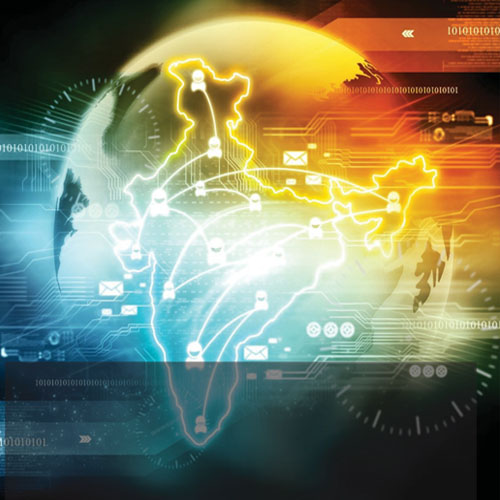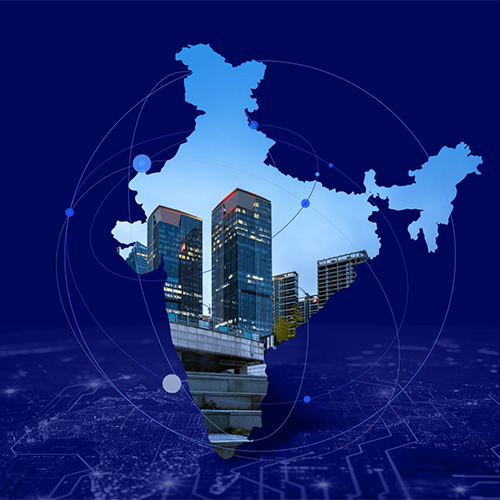
Twenty Industry Giants Leading the Charge in AI, Cloud Computing, Fintech, and Digital Infrastructure Innovation
India's technology sector stands at an unprecedented inflection point. What began as a cost-effective outsourcing destination has evolved into a global innovation powerhouse, with the country now housing the world's third-largest startup ecosystem. As per the Department for Promotion of Industry and Internal Trade (DPIIT), India is home to over 156,041 recognized startups, creating more than 1.5 million jobs and fundamentally reshaping the nation's economic landscape.
The transformation is staggering in its scope and scale. According to NASSCOM's Strategic Review 2025, India's IT services market is projected to reach $44.02 billion by 2029, growing at a compound annual growth rate of 10.12%. More tellingly, the country now boasts 123 unicorns with combined valuations exceeding $185 billion, as reported by Tracxn's September 2025 analysis. This digital revolution is being spearheaded by 20 technology companies that are not merely adapting to change but actively driving it across artificial intelligence, cloud computing, fintech, and digital infrastructure.
From traditional IT giants reinventing themselves through AI integration to fintech unicorns democratizing financial services, these companies represent the vanguard of India's journey toward its ambitious goal of achieving a $1 trillion digital economy by 2025, as outlined in the government's Digital India initiative.
THE DIGITAL INDIA FOUNDATION: BUILDING TOMORROW'S INFRASTRUCTURE
The foundation of India's technology transformation rests on robust government policy support and unprecedented private sector innovation. The Digital India program, launched in 2015, has created a conducive ecosystem built on three fundamental pillars: digital infrastructure as a utility for every citizen, governance and services on demand, and digital empowerment of citizens through digital literacy.
The statistical evidence of this transformation is compelling. As per EY's Digital Transformation India report, the nation is expected to witness a 20% increase in IT sector jobs in 2025 alone. The startup ecosystem has particularly flourished, with the Union Budget 2024 abolishing angel tax for all investor classes, effective from FY 2025-26, significantly boosting investment confidence.
Infrastructure development has been equally impressive. According to Mordor Intelligence's India Digital Transformation Market report, private 5G deployments commenced in 2024, with telecom operators earmarking over INR 2 lakh crore for 5G coverage in industrial corridors and urban clusters through 2027. The Bharat 6G Initiative has allocated INR 10,000 crore for next-generation research, demonstrating policy continuity beyond current technology cycles.
Cloud adoption has reached a tipping point, with NASSCOM research indicating that cloud-native technologies will comprise 70% of India's total cloud market by 2024. This infrastructure backbone enables the sophisticated digital services and platforms that are transforming everything from financial services to education and healthcare.
TRADITIONAL IT GIANTS: REINVENTING GLOBAL LEADERSHIP
The Big Six Evolution India's traditional IT powerhouses – collectively known as the "Big Six" comprising TCS, Infosys, Wipro, HCL Technologies, Tech Mahindra, and LTIMindtree – have successfully navigated the transition from labor arbitrage to innovation-led growth. These companies, often referred to by analysts using acronyms like "WITCH" (Wipro, Infosys, TCS, Cognizant, HCL), continue to dominate the global IT services landscape while reinventing their service offerings.
Tata Consultancy Services (TCS), with over 607,000 professionals globally, maintains its position as the world's largest IT services company. As per the company's latest financial reports, TCS demonstrated strong growth with revenue reaching $30 billion in fiscal 2025, driven by investments in AI, cloud computing, and digital transformation projects. The company's workforce of 607,354 employees (as of Q3 FY25) reflects both its scale and recent strategic adjustments.
Infosys has positioned itself as a leader in next-generation services through its Springboard initiative, which aims to empower 10 million people globally with essential tech skills by 2025. The company's partnerships with Coursera and Harvard Business Publishing provide free access to cutting-edge courses in emerging technologies, reflecting its commitment to talent development and innovation.
Wipro, under CEO Srini Pallia's leadership since April 2024, has embraced digital transformation strategies focused on cloud computing, AI, and cybersecurity solutions to drive growth in 2025. The company's strategic acquisitions have strengthened its capabilities in high-growth areas, positioning it for sustained expansion in the global market.
INNOVATION AND MARKET EXPANSION
These traditional giants have invested heavily in emerging technologies while maintaining their core strengths.
HCL Technologies has established itself as a leader in engineering and R&D services, with particular strength in manufacturing and energy sectors. The company's focus on digital transformation and cloud services has created significant opportunities for career growth and technological advancement.
Tech Mahindra has transformed itself into a powerhouse of digital innovation, with strategic focus on AI-driven solutions spanning banking, healthcare, and public services. Notably, the company's partnership with NVIDIA for developing AI solutions specifically for India's diverse linguistic landscape demonstrates its commitment to localized innovation while thinking globally.
LTIMindtree, formed through the merger of L&T Infotech and Mindtree, represents the new generation of mid- cap IT companies with expertise in cloud, data analytics, and customer experience solutions. The company's agile approach and specialized capabilities have enabled faster growth compared to larger peers.
GLOBAL TECHNOLOGY GIANTS: ANCHORING INDIA'S INNOVATION ECOSYSTEM
Cloud Computing Revolution Global technology leaders have made India central to their growth strategies, establishing significant operations and innovation centers across the country. Microsoft's presence in India exemplifies this trend, with the company employing thousands of professionals and operating multiple development centers focused on cloud computing, AI, and enterprise solutions.
Amazon Web Services (AWS) has made substantial investments in Indian data center infrastructure, recognizing the country's potential as a major cloud consumption market. The company's partnerships with local enterprises and government bodies have accelerated cloud adoption across industries, from startups to large enterprises.
Google India has positioned itself as an AI-first company, with significant investments in research and development focused on machine learning, natural language processing, and regional language computing. The company's initiatives in digital payments through Google Pay and cloud infrastructure through Google Cloud Platform demonstrate its comprehensive approach to the Indian market.
ENTERPRISE INNOVATION AND GLOBAL DELIVERY HUBS
IBM India has emerged as a critical innovation hub for the global technology giant, particularly in quantum computing and enterprise AI. As per recent industry reports, IBM and TCS deployed India's largest quantum computer at Quantum Valley Tech Park in Amaravati, signaling the country's emergence as a frontier technology destination. IBM's India operations employ over 130,000 professionals, making it one of the company's largest global workforces outside the United States.
Oracle India serves as a major development center for database technologies and enterprise software solutions, while SAP Labs India has established itself as the German software giant's largest research and development hub outside of Europe. These centers not only serve local markets but contribute significantly to global product development and innovation.
Cisco has built substantial operations in India with over 13,000 employees across multiple centers, focusing on networking hardware, cybersecurity solutions, and collaboration technologies. According to Cisco's India strategy reports, the company views India as both a critical market and a key innovation hub for developing next-generation networking solutions, particularly in areas like 5G infrastructure, IoT platforms, and AI-driven security solutions.
The presence of these global giants has created a technology transfer ecosystem that benefits the entire Indian IT industry through knowledge sharing, talent development, and collaborative innovation initiatives.
FINTECH REVOLUTION: DEMOCRATIZING FINANCIAL SERVICES
Payment Infrastructure Transformation India's fintech sector represents one of the most successful digital transformation stories globally. According to Fintech News Singapore's analysis, India ranks third globally with 28 fintech unicorns, trailing only the United States and China. The fintech sector now represents 5% of total revenues generated by all banking, financial services, and insurance companies in India.
PhonePe has emerged as a dominant force in digital payments, leveraging India's Unified Payments Interface (UPI) infrastructure to process billions of transactions monthly. The company's expansion into financial services, insurance, and investment products demonstrates the evolution from payments to comprehensive financial platforms.
fundamentally transformed Indian retail through technology-driven solutions. Flipkart, valued as one of India's most valuable startups, has built sophisticated logistics networks, AI-powered recommendation engines, and supply chain optimization systems that serve millions of customers across the country.
The company's focus on technology development extends beyond e-commerce to logistics excellence through its supply chain solutions. Flipkart's investments in AI, machine learning, and data analytics have enabled personalized shopping experiences and efficient inventory management.
NVIDIA has positioned India as a critical hub for AI computing innovation, with substantial investments in research and development centers across Bangalore, Pune, and Hyderabad. As per NVIDIA's partnership announcements, the company collaborates extensively with Indian enterprises and startups to accelerate AI adoption across industries. The company's focus on GPU computing for artificial intelligence, machine learning, and high- performance computing has made it instrumental in India's AI transformation, particularly in sectors like automotive, healthcare, and financial services.
Razorpay has built India's most comprehensive payment infrastructure, serving over 8 million businesses with payment gateway solutions, banking services, and lending products. The company's valuation of $7.5 billion reflects investor confidence in India's digital payments potential and the company's technology capabilities.
Paytm (One97 Communications) pioneered the super app model in India, combining payments, e-commerce, financial services, and entertainment in a single platform. Despite market volatilities, the company continues to play a crucial role in financial inclusion, particularly in semi- urban and rural markets.
FINANCIAL TECHNOLOGY INNOVATION
The fintech ecosystem extends beyond payments to encompass lending, insurance, and investment technology. Companies like Navi Technologies have focused on digital lending with AI-driven credit assessment, while others like MoneyView have built comprehensive personal finance management platforms.
As per EY's GenAI India 2025 report, AI-powered chat, voice, and regional language tools are making significant impact in financial services, with solutions like NPCI's Hello! UPI and various chatbot implementations enhancing inclusivity for underserved populations in semi-urban and rural areas.
The success of Indian fintech companies has attracted global attention and investment, with the sector raising significant funding despite global economic uncertainties. The abolition of angel tax has further boosted investment confidence, with startups raising $330 million by January 2025 according to industry reports.
E-COMMERCE AND CONSUMER TECHNOLOGY: RESHAPING RETAIL
Market Leadership and Innovation Flipkart and Amazon India have fundamentally transformed Indian retail through technology-driven solutions. Flipkart, valued as one of India's most valuable startups, has built sophisticated logistics networks, AI-powered recommendation engines, and supply chain optimization systems that serve millions of customers across the country.
The company's focus on technology development extends beyond e-commerce to logistics excellence through its supply chain solutions. Flipkart's investments in AI, machine learning, and data analytics have enabled personalized shopping experiences and efficient inventory management.
Amazon India has leveraged its global technology capabilities while adapting to local market requirements. The company's marketplace model has empowered millions of sellers, particularly small and medium enterprises, to access national markets through digital platforms.
TECHNOLOGY INTEGRATION AND FUTURE TRENDS
Both companies have invested heavily in emerging technologies including voice commerce, augmented reality for virtual try-ons, and regional language support to enhance accessibility. The integration of social commerce features and creator economy elements demonstrates the evolution of e-commerce platforms into comprehensive digital ecosystems.
The impact extends beyond retail to include logistics innovation, with both companies developing sophisticated last- mile delivery networks that serve as models for other industries. These capabilities have proven particularly valuable during the COVID-19 pandemic and continue to drive growth in tier-2 and tier-3 cities.
HARDWARE GIANTS AND INFRASTRUCTURE
LEADERS: POWERING INDIA'S DIGITAL FOUNDATION
Semiconductor and Processing Innovation
Intel has established India as one of its
most significant global development hubs, with major design centers in Bangalore and Hyderabad employing approximately 13,000 engineers. According to Business Today's report from July 2024, Intel elevated India to a separate geographical unit, highlighting the country's strategic importance. The company's India operations contribute significantly to global product development across data center processors, mobile chips, and IoT solutions, with Intel viewing India as crucial for AI innovation and infrastructure development.
Samsung India represents one of the Korean giant's largest global operations outside its home market, with significant manufacturing facilities and R&D centers. According to Samsung's India division, the company has invested over
$7 billion in India, establishing it as a major production hub for smartphones, displays, and semiconductor components. The company's Noida facility serves as a global manufacturing base, while its R&D centers in Bangalore focus on software development, mobile technologies, and emerging areas like 5G and IoT.
Enterprise Computing and Infrastructure
Dell Technologies has built a substantial presence in India through both manufacturing and services operations. As per Dell's recent strategic announcements, the company has invested significantly in local manufacturing capabilities while establishing India as a key market for enterprise computing solutions. Dell's focus on hybrid cloud infrastructure, edge computing, and digital workspace solutions aligns with India's enterprise digital transformation requirements.
HPE (Hewlett Packard Enterprise) has positioned India as a critical market for its enterprise technology solutions, with particular emphasis on hybrid cloud platforms, AI-driven infrastructure, and edge computing. According to HPE's market strategy reports, the company's GreenLake cloud services and AI-powered infrastructure solutions are gaining traction among Indian enterprises seeking to modernize their IT infrastructure while maintaining control over data sovereignty requirements.
CREATIVE TECHNOLOGY AND DIGITAL PLATFORMS
Adobe has made India its largest employee base outside the United States, with approximately 7,800 professionals across multiple development centers. According to Adobe's official announcements from 2023, the company opened a new office tower in Bangalore to accommodate over 2,000 additional employees, demonstrating continued expansion plans. Adobe's India operations focus on developing creative software solutions, digital marketing platforms, and document management systems that serve global markets.
The company's Creative Cloud suite, Experience Cloud, and Document Cloud platforms are widely adopted across Indian enterprises and creative industries, while Adobe's investment in AI-powered features and regional language support demonstrates its commitment to the Indian market's unique requirements.
Meta (Facebook) has established significant operations in India, recognizing the country as its largest user base globally with over 400 million users across Facebook, WhatsApp, and Instagram. According to Meta's investment announcements, the company has committed over $1 billion to Indian digital infrastructure through data centers and content delivery networks. Meta's focus on developing India-specific features, regional language support, and small business tools reflects the platform's strategy to serve diverse Indian market segments.
CONSULTING AND PROFESSIONAL SERVICES INTEGRATION
Accenture India represents one of the consulting giant's largest global operations, employing over 200,000 professionals across multiple cities. As per Accenture's annual reports, India contributes significantly to the company's global delivery capabilities across consulting, technology services, and outsourcing operations. The company's focus on digital transformation, AI implementation, and cloud migration services positions it as a key enabler of enterprise technology adoption across Indian businesses and multinational corporations operating in India.
These hardware and infrastructure companies provide the foundational technologies that enable India's digital transformation, from semiconductor innovation and enterprise computing to creative software platforms and social media connectivity. Their substantial investments in Indian operations demonstrate the country's critical role in global technology development and delivery.
KEY TRANSFORMATION AREAS: TECHNOLOGY DRIVERS
Artificial Intelligence and Machine Learning
According to EY's GenAI survey of over
125 C-suite executives across India, 36% of Indian enterprises have allocated budgets and begun investing in GenAI, while another 24% are testing its potential. The technology sector leads adoption, followed by life sciences and financial services.
The transformation encompasses multimodal AI integration, task-specific AI agents, and industry-specific applications. Deloitte's Tech Trends 2025 India report highlights how AI is becoming the foundation of nearly every emerging technological trend, acting as the backbone for innovation across industries.
5G AND EDGE COMPUTING
India's 5G rollout represents a massive infrastructure transformation with operators investing over INR 2 lakh crore for coverage expansion through 2027. Private 5G deployments have already commenced, with companies like Airtel enabling smart factory operations for real- time quality inspection and predictive maintenance.
Edge computing adoption is accelerating alongside 5G deployment, enabling real- time data processing and reducing latency for critical applications in manufacturing, healthcare, and smart city initiatives.
CYBERSECURITY AND DATA PROTECTION
With India recording more than
1.5 million cyber incidents in 2025, cybersecurity has become a critical technology focus area. Projected losses of INR 20,000 crore to fraud, ransomware, and phishing scams underscore the urgent need for advanced security solutions.
Companies are investing in quantum-safe encryption, AI-powered threat detection, and comprehensive data protection frameworks to address evolving security challenges in an increasingly connected digital ecosystem.
CHALLENGES AND FUTURE OPPORTUNITIES
Talent Development and Skills Gap
Despite India's reputation as a technology talent hub, significant skills gaps persist in emerging areas. NASSCOM estimates a requirement for 2.2 million cloud professionals by 2025, with supply
gaps particularly acute in AI, cybersecurity, and industrial IoT domains.
Corporate response has been substantial, with Microsoft's ADVANTA(I)GE INDIA planning to train 2 million individuals in AI skills, while government reskilling programs under Digital India address 625,000 IT workers. However, meaningful impact requires sustained effort and collaboration between industry, academia, and government.
INFRASTRUCTURE INVESTMENT AND POLICY SUPPORT
The success of India's technology transformation depends on continued infrastructure investment and supportive policies. The government's approach of abolishing angel tax, providing startup recognition benefits, and investing in digital infrastructure creates a conducive environment for continued growth.
However, challenges remain in areas such as data localization compliance, regulatory clarity for emerging technologies, and ensuring equitable access to digital services across urban and rural populations.
CONCLUSION: LEADING THE GLOBAL TECHNOLOGY REVOLUTION
The transformation of India's technology landscape through these 20 leading companies represents more than economic success – it signifies the country's evolution from a technology consumer to a global innovation leader.
From TCS and Infosys pioneering the global delivery model to fintech unicorns like PhonePe and Razorpay democratizing financial services, these companies have collectively created an ecosystem that rivals Silicon Valley in its innovation capacity and global impact.
The journey toward India's $1 trillion digital economy by 2025 is well underway, supported by robust infrastructure development, supportive government policies, and a thriving entrepreneurial ecosystem.
As artificial intelligence, 5G, quantum computing, and sustainable technologies reshape global markets, India's technology companies are not merely participating in this transformation – they are leading it.
The future promises even greater possibilities as these companies continue to push the boundaries of innovation while addressing local challenges and global opportunities.
India's technology revolution, powered by these 20 transformative companies, is reshaping not just the domestic landscape but contributing to the global technology future, establishing the country as an indispensable hub of innovation, talent, and technological excellence.
See What’s Next in Tech With the Fast Forward Newsletter
Tweets From @varindiamag
Nothing to see here - yet
When they Tweet, their Tweets will show up here.




























